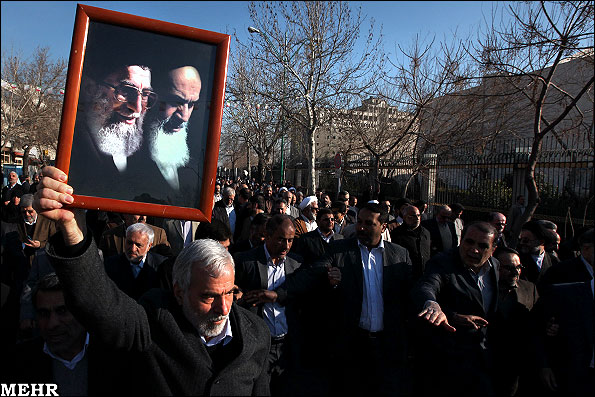![]()
Sun, Feb 20, 2011 | The Meir Amit Intelligence and Terrorism Information Center

Iranian lawmakers held a rally in front of the Majlis building on Sunday morning in support of the Egyptian revolution. (Photo: Ra'ouf Mohseni/Mehr News)
Iran and the post-Mubarak “New Middle East”
Revolution victory day becomes day of President Mubarak’s fall: Iran and the post-Mubarak “New Middle East”
This week, Iran’s conservative media gave extensive coverage of President Mubarak’s resignation, claiming that the fall of the Egyptian president heralds the dawn of a new era in the Middle East, one in which Iran will likely play a major part.
The conservative daily Jomhuri-ye Eslami argued that, with Hosni Mubarak’s fall, the U.S. has lost its staunchest supporter in the Middle East, and that the “Zionist regime” now faces a bleak future. An editorial published by the daily says that the fall of Mubarak’s regime marks the beginning of a major revolution against the Americans and the Zionists in the Middle East and North Africa. According to the daily, the U.S. and the Zionists will try their best to rebuild their regional status. Islamic revolutionists in the region, therefore, are tasked with a mission of utmost importance: to take this opportunity to wipe out the influence of imperialism once and for all. Iran must play a major part in that effort. The massive participation of Iranians in the Islamic revolution victory processions on February 11 reflects, Jomhuri-ye Eslami says, not only the Iranian people’s loyalty to the revolution and the regime, but also their expectations that the senior figures in the political establishment avoid dissent, fully understand the conditions prevailing in the region and in the world, and use them for the good of the deprived and oppressed peoples of the region (Jomhuri-ye Eslami, February 12).
In another editorial, the daily issued a warning that the process begun in Egypt has yet to come to completion. Jomhuri-ye Eslami took a critical view of the announcement made by Egypt’s army leaders stating that they will honor the peace treaty with Israel, saying that the announcement was an indication that the basic requirement of the Egyptian people to topple the regime has not been realized in full. The developments in Egypt may eliminate Mubarak’s dictatorship, the article says; however, if they are not wisely managed by Egypt’s political and religious leaders, the result will be another dictatorship only under a different dictator. The Americans are interested in creating conditions that will allow them to maintain their own and the “Zionist regime’s” imperialist interests in Egypt. The stance taken by the army may delay the revolution’s completion, the daily warned. The revolutionary spirit of the Egyptian people, however, will not let the U.S. and Israel realize their demands, and the revolutionary conditions in the region will not allow Egypt to revert to the Mubarak-era reality. (Jomhuri-ye Eslami, February 14)
The daily Keyhan also predicted that the fall of Mubarak’s regime will deal a major blow to the regional status of the U.S. The Middle East will never be the same, the political geography of the region will quickly change, and the Egyptian revolution is likely to spread to the rest of the dictatorships in the region, the daily argued. Keyhan listed three possible options the Americans may employ in an attempt to deal with the fall of Mubarak’s regime: military attack and takeover of such strategic sites as the Suez Canal and the Sinai Desert, attempt to stage a counter-coup in Egypt, and attempts to stage coups and incite public order violations in countries belonging to the “axis of resistance”. Each option, Keyhan said, will probably fail. According to the daily, the U.S. will become confined to the fringes of the Middle East, while Israel will be forced to carry the burden of the siege and pay for its aggression against Islamic countries. Iran’s status, however, will likely strengthen—being a source of inspiration for the anti-American movements in the region, it will now take charge of the developments in the Middle East (Keyhan, February 12).
The conservative daily Siyasat-e Rooz also commented on the fall of Mubarak’s regime, saying that the defeat of the West was caused by its refusal to acknowledge the rise of Islam and Iran’s regional strength, and by its attempt to use force when dealing with the global Islamic wave. According to the daily, now that the West has been defeated, Islam will become the only factor to shape Middle Eastern developments, and a way of life to replace capitalism and tyranny-based secularity. The U.S. has lost the most from its attempt to establish a new Middle East based on Israeli hegemony. Even if the popular uprisings do not lead to the establishment of completely Islamic governments—the chance for which is slim—they will strengthen the Iran-led front of resistance (Siyasat-e Rooz, February 13).
In its latest issue, Revolutionary Guards mouthpiece Sobh-e Sadeq also claimed that the developments in the Arab world will strengthen the Islamic front of resistance led by Iran, and that the Middle East will likely become an Islamic Middle East. Not only will Americans, Europeans, and Zionists not be able to play an active role in that Middle East, its countries will form a united front against the Zionists and their supporters. The “Zionist regime” is extremely concerned over the developments in Egypt, the weekly says, assuming that Mubarak’s fall brings it one step closer to its demise. The formation of an Islamic Middle East instead of an American Middle East will influence the future of the whole world. The current century will be the century of Islam, heralding the victory of the oppressed over the oppressors. It is a new future in the Middle East where Iran is destined to fulfill a major role (Sobh-e Sadeq, February 14).



 RSS
RSS










#Iran and the Post-#Mubarak New Middle East | #Islamism #Shiism #Islamic http://j.mp/emV2h4
RT @CrethiPlethi: #Iran and the Post-#Mubarak New Middle East | #Islamism #Shiism #Islamic http://j.mp/emV2h4